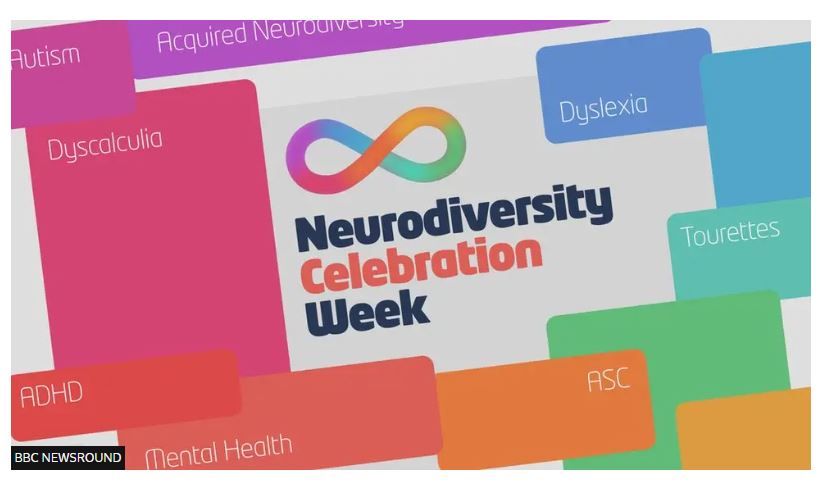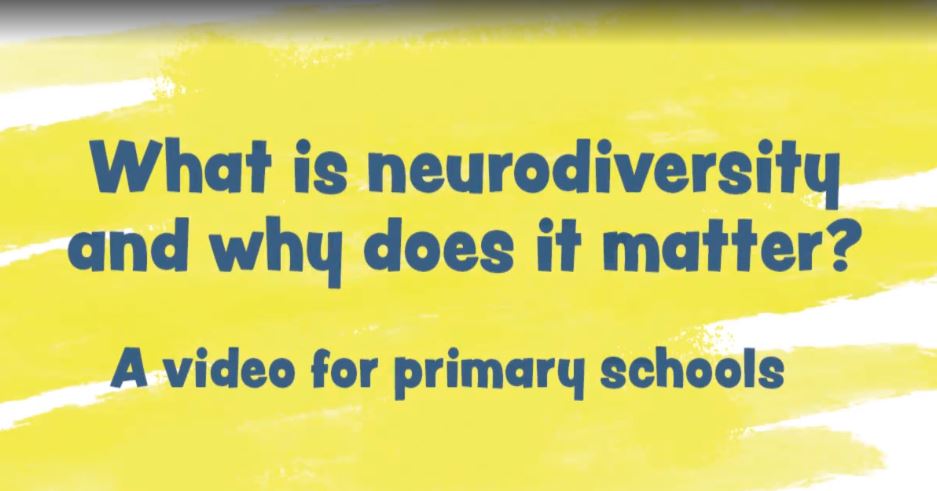SENDCO Contact Information
Sarah Heck (SENDCO)
Stoneyholme Community Primary School
Oswald Street
Burnley
Lancashire
BB12 0BN
s.heck@stoneyholme-pri.lancs.sch.uk
Telephone: 01282 437190
SEND Latest News
Check out the courses below that are being delivered by the
Family Autism Service
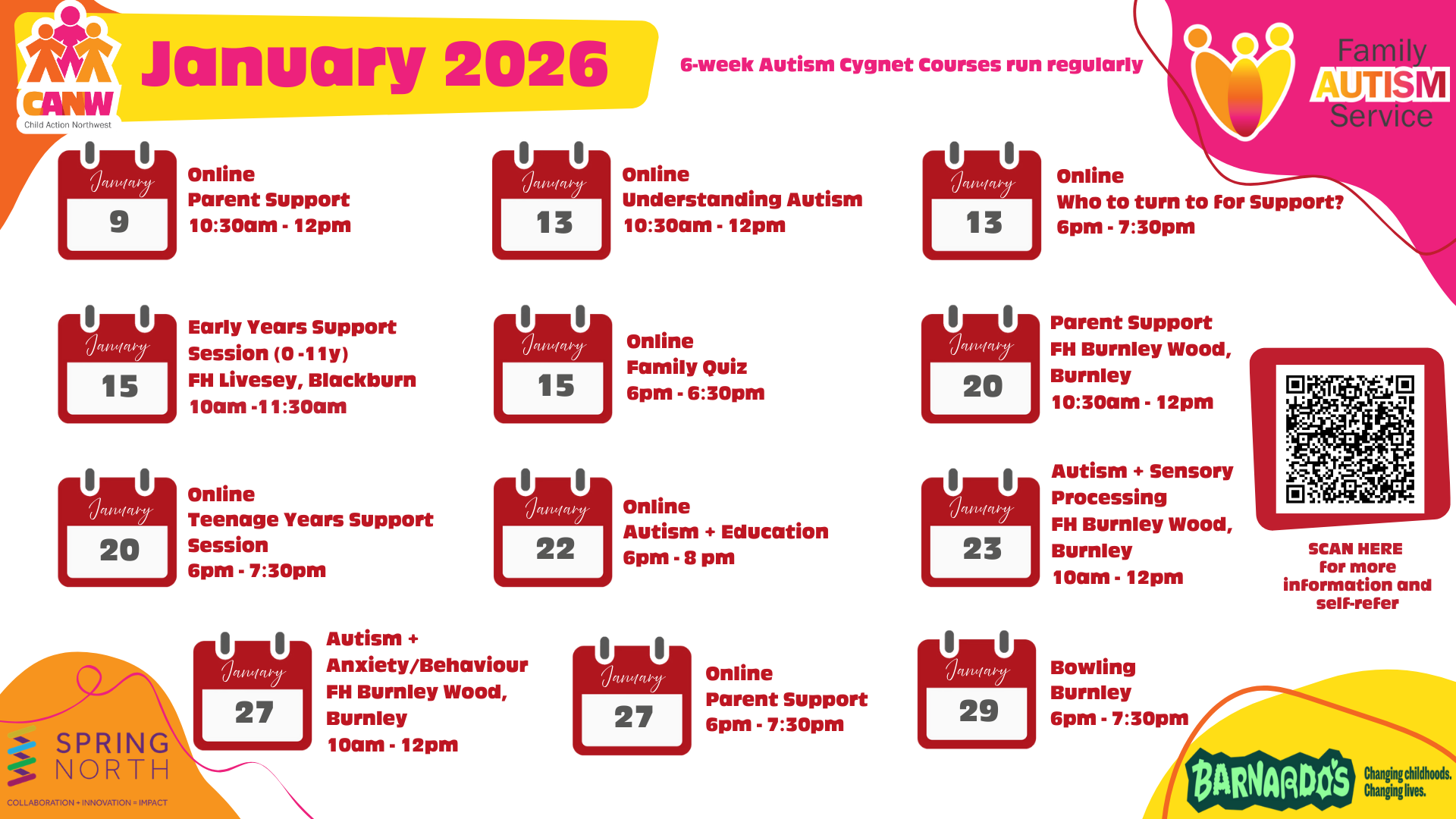
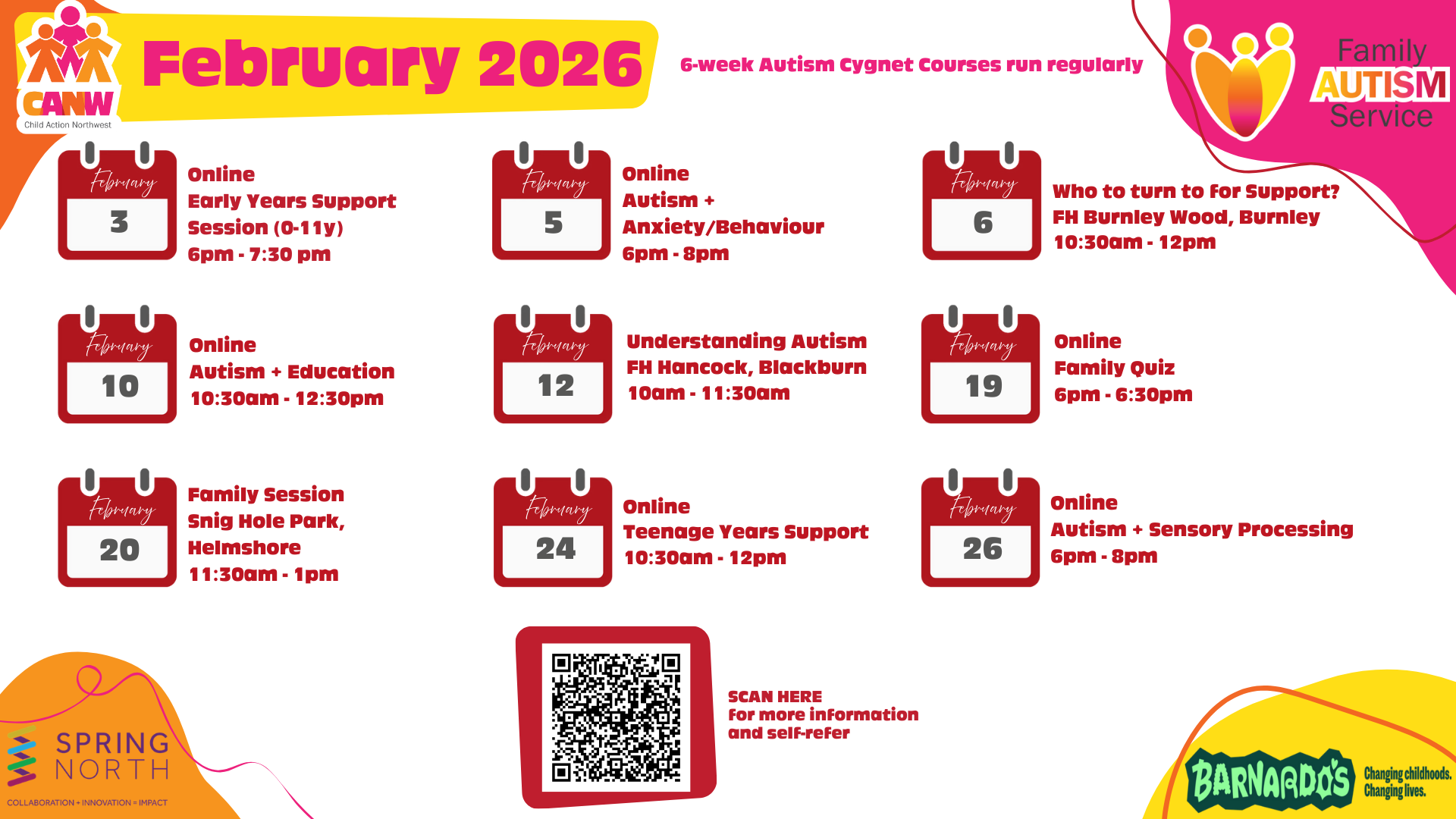

SEND Roadshow 2025/2026
Event for Families and Practitioners
Burnley Football Club
3rd December 9.30-1pm
Family Information Network Directory SEND Newsletters for Lancashire families.
Autumn 2025 SEND Newsletter
send newsletter autumn 2025.pdf
Breaktime - REGISTER NOW!
break time registration 202526 reopening 13th june 2025.pdf
Neurodiversity Celebration Week kicks off from 18-24th March
Click on the picture below to find out what it means to have a neurodifference.
Click on the image below to learn what neurodiversity is and and why it matters.
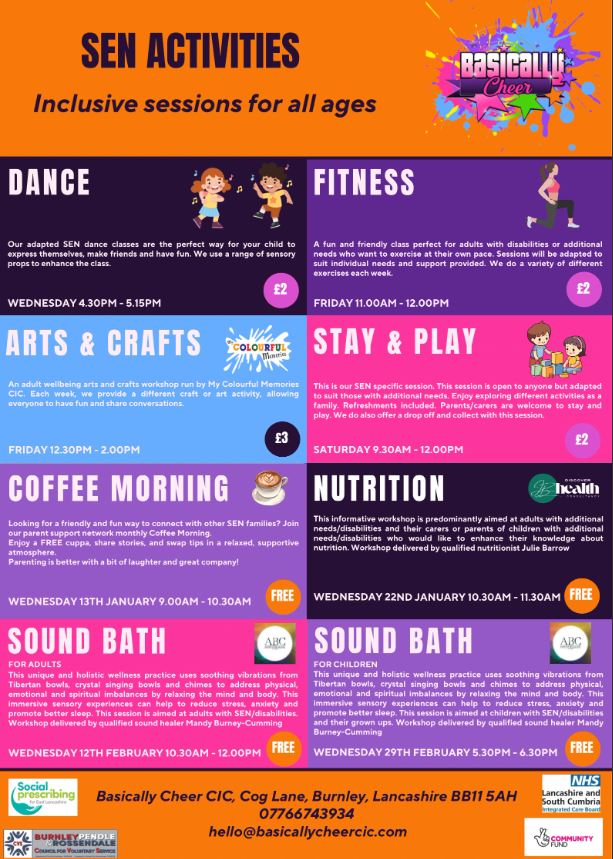

Raising Awareness for Development Language Disorder (DLD)
Click on the links below to find out more about what DLD is and what you can do to support your child.
Raising Awareness of Developmental Language Disorder
BBC Tiny Happy People. What is DLD?
ADHD Awareness October 2024
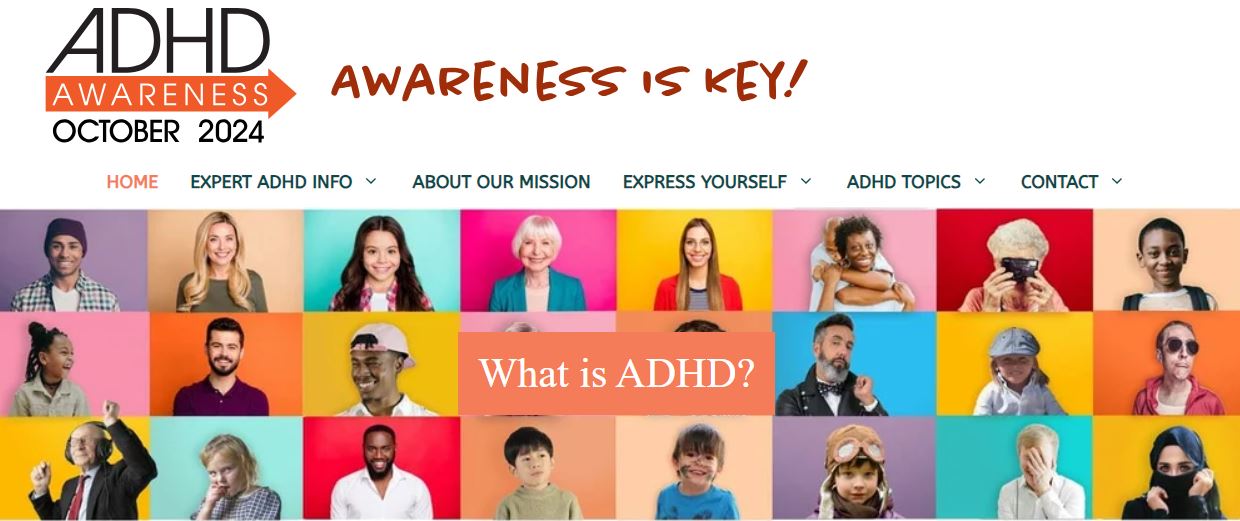 Click on the image above to find out more information about ADHD.
Click on the image above to find out more information about ADHD.
The ADHD Foundation Neurodiversity Charity
Family Information Network Directory SEND Newsletters for Lancashire families.
Summer SEND Newsletter
send newsletter summer 2025.pdf
Spring SEND Newsletter
send newsletter spring 2025.pdf
Winter SEND Newsletter
send newsletter winter 2024.pdf
Autumn SEND Newsletter
send newsletter autumn 2024.pdf
Register for Breaktime
break time registration flyer october 2024.pdf
Family Autism Service

Lancashire Local Offer Facebook page

Facebook page Lancashire Local Offer
Family Matters courses in Burnley

The Parenting Hub
What is Speech and Language Therapy?
Keyworking Service
cyps keyworking and autism intensive support service april 2023.pdf
Lancashire SEND Partnership

Limitless Clarets SEND Specific Sessions

limitless clarets and kicks timetable.pdf
Burnley Neighbourhood Centres
whats on timetable september 2022.pdf
Talking about Feelings
parents and carers support pack for talking to your children about their feelings 1 .pdf
SEND Information Report
Stoneyholme Community Primary School SEN Information for Parents 2025 – 2026
SEN Information Report and School’s Contribution to the LOCAL OFFER Revised September 2025
Stoneyholme Community Primary School
Special Educational Needs Report and School’s Local Offer
At Stoneyholme Community Primary School, we believe that every child is entitled to a curriculum that “enables them to achieve the highest possible standards, develops the whole child by catering for their social, emotional, physical, intellectual and moral development and encourages purpose, self-discipline, independence and community responsibility in a caring, supportive, positive and secure learning environment”. We believe that the curriculum is the key to promoting our aims for all children. We believe the education of our children is very much a partnership between the school, the child and the home.
We aim to cater for the individual learning needs of every child whilst also recognising the need for specialised provision to ensure access to all aspects of the curriculum for all children. We also recognise that pupils of any ability can underachieve at times. Through matching work to the needs of the children, and using an adaptive approach staff at Stoneyholme Primary School give children every opportunity to overcome their difficulties.
What kinds of special education needs do we make provision for in our school?
Stoneyholme Community Primary School is a mainstream primary school. Every teacher is a teacher of every child or young person, including those with SEND.
A child or young person has SEN if they have a learning difficulty or disability which calls for special educational provision to be made for him or her.
These needs can be categorised in four broad areas that may create barriers to learning:
- Communication and interaction;
- Cognition and learning;
- Social, emotional and mental health difficulties;
- Sensory and/or physical needs.
(SEND code of practice 2015)
A student has a learning difficulty or disability if he or she:
- Has a significantly greater difficulty in learning than the majority of students of the same age;
- Has a disability, which prevents or hinders the child from making use of facilities of a kind generally provided for others of the same age in mainstream
Who is the SENDCo and how can parents make contact?
The school’s SENDCo is Mrs Sarah Heck. The SENDCo can always be contacted by email: s.heck@stoneyholme-pri.lancs.sch.uk
Every Wednesday 8.30- 10am we have a Coffee morning / SEND drop in where parents can chat to Mrs Heck.
Alternatively, an appointment to see Mrs Heck can be made via the school office by telephoning: 01282 437190
How do we identify a child with Special Educational Needs or Disabilities (SEND) and how do we assess their needs?
The school places significant emphasis on the early identification of pupils experiencing difficulties accessing learning and general school life opportunities. Progress is tracked on a termly basis and where appropriate, more frequently than this. Class teachers discuss any concerns with the SENDCo and Senior Leadership Team. If further action is deemed necessary, the parents will be informed immediately.
The SENDCo liaises closely with the Senior Leadership Team and class teachers to analyse data and individually track pupils experiencing difficulties. Baseline information, EYFS information, SATS, PIVATS, standardised scores and specialist teacher screening in addition to ongoing assessments and observations are all used to inform the school of pupils who may require early intervention strategies.
The school has adopted a policy of high-quality differentiated planning to accommodate a wide range of pupils with varying abilities. Pupils will only be placed on the SEN Register if their needs are “additional to” or “different from” the quality differentiated teaching and learning opportunities:
- Children who, in spite of differentiation within class or targeted intervention, continue to make slow progress in relation to their peers.
- Children who, in spite of differentiation within class or targeted intervention, remain unable to access the curriculum of the majority of their peers.
- Children for whom, in spite of differentiation within class or targeted intervention, the gap between the attainment of the majority of their peers or age-related attainment continues to be significant.
- Children who have identified medical needs or a sensory or physical impairment that requires the school to make special arrangements for their care.
- Children who have an identified need beyond that which would be provided through normal classroom differentiation or group intervention programmes such as speech and language needs.
- Children who have outside agency involvement relating to their specific needs.
For children on the SEN register who require specific small step targets to enable them to make best academic progress, TLP plans (Targeting Learning Plans) are devised which identify particular areas of need, build on what the child is able to do and detail what support will be put into place in order to meet specific needs.
FORMAL ASSESSMENT - Where a child’s needs cannot be met solely by the arrangements described above the SENDCo will put the child forward for formal assessment to the LEA. If the child’s needs are such that the LEA believes that additional resourcing is required to fully support their needs, then an EHCP is issued outlining the provision to be made.
A register of all pupils identified as having special educational needs is kept by the SEN coordinator in consultation with the class teachers.
How will our school support your child and how will teaching be adapted to meet their needs?
At Stoneyholme Primary School we adopt a graduated approach to meeting the needs of children who may have SEN. Teacher’s planning is adapted to meet the needs of all children. Children who have identified further needs may undertake specific programmes to enable access to the curriculum or may be supported in class by allocated Learning Support Assistants (LSAs). Children on the SEN register who have cognition and learning needs will have an TLP Plan (Targeting Learning Plan) which details small step targets and the provision put in place to enable them to work towards these targets. Children with physical and sensory needs will be provided with appropriate equipment and support. At times some children receive additional support from external agencies bought in by the school. Our prime purpose in providing additional support is for all children to become as independent learners as they can be and we are very sensitive towards achieving just the right balance of supported and unsupported learning for each child. Strategies for achieving this are discussed at half termly progress meetings, weekly pastoral meetings, review meetings and Early Help meetings.
How do we know what progress your child is making and how will we keep you informed?
All teachers have a key role in monitoring all aspects of pupil performance and, in particular, the identification of pupil needs. Parents will be kept informed at all stages.
Assessment is central to our planning for all pupils. In assessment we:
- Analyse the child’s learning difficulty;
- Clarify the child’s needs for different kinds of approaches or resources;
- Provide for those needs, whilst continually assessing the child’s progress.
Assessing special educational needs is not an end in itself but a first step to understanding and providing for the child’s needs and monitoring the child’s progress.
Particular use is made of ongoing teacher assessment as well as:
- Early Years Foundation Stage Profile information
- SATs
- PIVATS profiles
- PEN Pictures/One Page profiles
- Behavioural profiles
TLPs for children who have been identified as requiring SEN support are reviewed weekly and updated regularly. Staff supporting children in progress towards TLP targets maintain regular records which feed into reviews and updates. Teachers and support staff have weekly discussions to discuss progress of children and raise any concerns. The SENDCO monitors these meetings regularly and responds to any concerns raised in relation to children requiring SEN support.
Children’s progress is monitored half termly and senior leaders undertake provision mapping to respond to needs identified.
Parents will receive copies of their child’s TLP and reviewed TLPs. Parents are also informed if their child is to be included in an intervention group or is to receive one to one intervention.
Parents meetings are held twice a year. Parents also receive information about their children’s progress through a termly report.
Parents are invited to attend Team Around the Family (TAF) meetings and annual reviews for children with a statement or EHCP.
How will staff support my child?
All pupils with SEN will have a full entitlement to a broad and balanced curriculum as provided for all other pupils. The school’s main aim is to provide a variety of teaching and learning opportunities, adaptive planning opportunities, appropriate support and resources all within the child’s classroom. In order to maximise their access to the curriculum, some pupils may be taught in withdrawal groups or on a 1:1 basis for short periods of time. In addition to support with curriculum access, we also respond swiftly to social and emotional needs and employ a pastoral and additional needs team with a wide range of experience and expertise. We meet the needs of children with medical needs, sensory or physical impairment by consulting with a wide range of professionals and ensuring that their recommendations are put into place.
How will my child be included in activities outside the school classroom including school trips?
At Stoneyholme Primary School we place a high emphasis on the importance of learning outside the classroom. We make every effort to ensure that no child is excluded from any of the activities provided. All activities are risk assessed and this will include any special or additional provision needed in order for children who have SEND needs to be included. We ensure that when planning trips and visits outside of school the provider is contacted and made aware of the specific needs of any of the participants in order that appropriate provision can be made. Additional adults are deployed as necessary to ensure that all children are enabled to participate as fully as possible in all learning outside the classroom opportunities. The physical environment outside of the school building is also under constant review and modifications are made as appropriate to improve physical access to our own outdoor areas.
How will our school prepare and support your child when joining our school and when transferring to a new school?
Parents who are considering applying for a place at school for their child are able to make an appointment to tour the school and talk to relevant members of staff to ensure they are confident that the provision we are able to make meets their needs. Pre-school children have several opportunities to spend time at the school on transition visits. Staff also visit the children’s homes to introduce themselves and ensure that we gather as much information as we can about each child prior to their attendance at school. We ensure that any specific requirements are put into place so that the children can access them as soon as they start school.
An appointment is made for parents applying for a place at school for children in others year groups to tour the school, meet the class teachers and go through the home school agreement. Contact is made with the previous school as soon as possible to ascertain any additional provision that may be needed.
When children join the school part way through the school year or into a year group other than EYFS, they will be assigned a ‘buddy’ by the class teacher in order to support their transition.
The SENDCo seeks to obtain records from previous schools with parental permission.
When children are allocated a place at High School the SENDCO liaises with staff at the school to ensure that they have all the required information about children with SEN or disability. In addition to transition days organised by the High Schools, additional visits will be organised for some children. These visits will be tailored to meet specific needs and the children will be accompanied by a member of our school staff so that follow up work can be done with them.
How are the staff in school supported to work with children with special educational needs and what training do they have?
Training is provided on a needs led basis. The school SENDCo attends termly SENDCo seminars to gain up to date information and knowledge related to SEND; gaining training materials to upskill staff in school. The school SENDCo provides advice and guidance to class teachers on supporting children with learning difficulties or seeks professional advice which is shared with all staff who are supporting particular children. CPD needs are established through Teacher Appraisal and support staff Professional Development Reviews and would include training needs relating to children with SEN or disability as appropriate.
Our Additional Educational Needs staff team have undertaken a range of training including speech and language, physiotherapy programmes etc. to support identified children.
A full list of intervention programmes which staff are trained to deliver is available to view on our website under Our school curriculum.
For staff supporting children with speech and language needs, hearing or visual impairments or physical needs professionals visit the school on a regular basis to review the progress and needs of the children and provide advice and guidance to school staff. In some instances, specialist support is bought in by the school to support staff with strategies for meeting the needs of children with high level needs.
What specialist services and expertise are available or accessible through our school?
The school is involved with many external agencies, with the aim of providing a comprehensive support for all pupils in school:
- Advisory teachers from the SEND support service
- Educational psychologists
- Speech and language Therapy Service
- Holly Grove Primary School
- Physiotherapy
- Occupational Therapy
- The School Nursing Team
We use the Early Help Assessment (EHA) process and Team Around the Family (TAF) to facilitate links with other agencies.
How accessible is the school environment?
The whole school can be accessed by any user via the main path accessible from Folds Street. The school gates are closed during session times but can be opened for specific purposes at other times of the day as needed. During school hours the usual access would be via the school office accessible from Oswald Street, although this is not suitable for wheelchair users as the school is on a lower level than the street and requires steps. Wheelchair users can access the building using the car park entrance.
Parking for parents is on street, however there is a dedicated disabled parking space in the car park, and a dropped kerb outside the main entrance to the building. Special arrangements are made with parents when needed.
Although the school is on two levels, it is possible to access all internal and external areas without the use of stairs. A path leads from the upper school area onto the playground enabling access to all outdoor areas. As the school has developed its outdoor provision, consideration is always given as to how to ensure accessibility for all. We have a disabled toilet, fitted with changing facilities, in the EYFS area of school and a sensory room is available.
All classrooms have low ceilings and lighting conducive to supporting children with specific auditory or visual needs.
How do we evaluate the effectiveness of provision made for children with SEN?
The success of all intervention programmes is monitored regularly at weekly pastoral meetings/discussions where teachers and support staff identify if children are making suitable progress through the intervention or if an alternative approach is required. On a child’s completion of the programme end data is recorded to measure progress. Half termly progress meetings also proved opportunities to evaluate outcomes for children receiving SEN support.
The school’s SEN policy is fully reviewed each academic year. In determining future policy and provision all staff will be involved in discussion, the progress of pupils on the register will be reviewed and parents invited to comment.
In particular the success of the policy will be measured against the objectives stated at the start of the policy and use will be made of the following indicators:
- Pupils identified as early as possible;
- Pupils make good progress against the specific targets set for them;
- Some pupils move off the register as a result of intervention;
- Where formal assessment is undertaken, pupils receive an ECHP;
- Pupils enjoy their schooling and are proud of their success;
- Parents express satisfaction with what is provided;
- Support staff are integrated into the school.
Roles and Responsibilities for those involved in SEND issues
|
Name |
Position |
|
Mrs L Davison |
Headteacher |
|
Mrs S Heck |
SENDCO |
|
Mrs Anisa Bibi |
Chair of Governors |
|
Awaiting Appointment |
SEN Governor |
|
Miss L Wilkinson |
Managing Medical Needs Responsibility |
|
Miss L Wilkinson |
DSL |
Where can I find the contact details of support services for the parents of children/young people with SEND?
During discussions with parents / annual reviews / TAF meetings we signpost to support services as appropriate.
We signpost parents to Lancashire’s Information and Advice Team (IAS) in order to access support.
The service provides information around the following areas in relation to SEND:
- rights, roles and responsibilities
- health and social care processes, regulations and guidance
- support from other agencies `and organisations
They can also support to families in:
- managing mediation appeals, to the First-tier Tribunal
- exclusion from school
- liaising between you, your nursery, school or college and other professionals
Where can I find information on where the local authority’s local offer is published?
Lancashire’s local offer can be found at
Additional information:
The school’s SEN policy can be found on the school website under ‘SEND Information’.
Complaints Procedure:
If any parent has any concerns regarding the education of their child with special educational needs, they should contact the school immediately via the contact us email address: contactus@stoneyholme-pri.lancs.sch.uk. An appointment will be made to see either, the SENDCO, the class teacher or the headteacher in line with the school’s standard complaints procedure which can be found on the school website under Whole School Policies or a hard copy obtainable from the school office. All concerns will be dealt with sensitively and with the child’s needs and care at the heart of our work.
SEND Local Offer
SEN Policy
Stoneyholme Community
Primary School
SEN Policy
Last updated: September 2025
Approved by Governors:
Review date September 2026
STONEYHOLME PRIMARY SCHOOL
Policy for Meeting Special Educational Needs
Name of SENDCO: Sarah Heck
SEN Governor: Awaiting Appointment
Introduction
Mission Statement
At Stoneyholme Primary School, we believe that every child is entitled to a curriculum that “enables them to achieve the highest possible standards, develops the whole child by catering for their social, emotional, physical, intellectual and moral development and encourages purpose, self-discipline, independence and community responsibility in a caring, supportive, positive and secure learning environment”.
We believe that our curriculum is the key to promoting our aims for all children.
We believe the education of our children is very much a partnership between the school, the child and the home.
Legislation (Special educational needs and disability code of practice: 0 to 25 years, DFE 2015) defines a child with special educational needs (SEN) as having:
- a) a significantly greater difficulty in learning than the majority of children his/her age
OR
- b) a disability which either prevents or hinders him/her from making use of educational facilities of a kind generally provided in schools, within the area of the local authority concerned for children of his age.
The 2014 SEN and Disability Act strengthens previous legislation by stating that children with SEN must be educated in mainstream schools where parents prefer this and where the provision of efficient education for other children is not significantly affected.
We support this view and therefore we aim to cater for the individual learning needs of every child whilst also recognising the need for specialised provision to ensure access to all aspects of the curriculum for all children.
We also recognise that pupils of any ability can underachieve at times. Through matching work to the needs of the children, staff at Stoneyholme Primary give children every opportunity to overcome their difficulties.
Objectives
The aims of the policy are:
- To identify pupils with SEN as early as possible and to make appropriate intervention through using appropriate teaching methods;
- To identify pupils of all ability who are underachieving and to act upon this;
- To support children to make the best progress of which they are capable;
- To maintain appropriate records and to monitor pupil progress;
- To provide full access to the National Curriculum. By providing full participation for pupils with
SEN, the promotion of good practice for all pupils will be encouraged;
- To develop partnership with parents in the education of their child;
- To encourage success and participation for all pupils, whatever their level of ability;
- To continue to develop a whole school approach to meeting the needs of pupils.
Good practice for children with special educational needs is good practice for all children.
The SEND co-ordinator will be responsible for the co-ordination of all matters relating to Special
Educational Needs and will liaise with outside agencies as well as overseeing provision within the school.
Admission arrangements.
Admission arrangements for the school are described in the school’s admissions policy. The school welcomes pupils irrespective of their ability and anticipates that the needs of most pupils will be met within existing school provision. Pupils with an EHCP will not be discriminated against in line with legislation outlined in the SEN and Disability Act 2014.
Identification and Assessment arrangements.
The school places significant emphasis on the early identification of pupils experiencing difficulties accessing learning and general school life opportunities.
The SENDCO liaises closely with the Senior Leadership Team and class teachers to analyse data and individually track pupils experiencing difficulties. Baseline information, EYFS information, SATS, PIVATS and standardised scores are all used to inform the school of pupils who may require early intervention strategies.
The school has adopted a policy of high-quality adaptive planning to accommodate a wide range of pupils with varying abilities. Pupils will only be placed on the SEN Register if their needs are “additional to” or “different from” the quality adaptive teaching and learning opportunities:
Children who, in spite of adaptive teaching within class or targeted intervention, continue to make slow progress in relation to their peers.
Children who, in spite of adaptive teaching within class or targeted intervention, remain unable to access the curriculum of the majority of their peers.
Children for whom, in spite of adaptive teaching within class or targeted intervention, the gap between the attainment of the majority of their peers or age related attainment continues to be significant.
Children who have identified medical needs or a sensory or physical impairment that requires the school to make special arrangements for their care.
Children who have an identified need beyond that which would be provided through normal classroom differentiation or group intervention programmes such as speech and language needs.
Children who have outside agency involvement relating to their specific needs.
For children on the SEN register who require specific small step targets to enable them to make best academic progress, TLPs (Targeted Learning Plans, which follow the cycle of assess, plan, do and review) are constructed which build on what the child is able to do and identify what areas the child needs additional support with.
- FORMAL ASSESSMENT - Where a child’s needs cannot be met solely by the arrangements described above the SENCOs will put the child forward for formal assessment to the LEA. If the child’s needs are such that the LEA believes that additional resourcing is required to fully support their needs, then an EHCP is issued outlining the provision to be made.
A register of all pupils identified as having special educational needs will be kept by the SEN
coordinator in consultation with the class teachers.
All teachers have a key role in monitoring all aspects of pupil performance and, in particular, the identification of pupil needs.
Parents will be kept informed at all stages.
Assessment is central to our planning for all pupils. In assessment we should:
- Analyse the child’s learning difficulty;
- Clarify the child’s needs for different kinds of approaches or resources;
- Provide for those needs, whilst continually assessing the child’s progress.
Assessing special educational needs is not an end in itself but a first step to understanding and providing for the child’s needs and monitoring the child’s progress. Particular use is made of teacher assessment as well as:
- Early Years Foundation Stage Profile information
- SATs
- PIVATS profiles
- Behavioural profiles
Co-ordination
The SENDCO is responsible for:
- Keeping a register of pupils with SEN and updating this;
- Supporting pupils with SEN in class;
- Supporting teachers in writing TLPs and assessing pupil progress;
- Purchasing and organising resources;
- Liaising with external agencies;
- Making referrals;
- Ensuring that appropriate records are kept;
- Supporting the transition of pupils with SEN into the school and into High school;
- Liaising with the SEN governor and preparing appropriate reports;
- Supervising non-teaching staff.
SEN Funding and Resources
The Head, SEN Governor and SENCO discuss the SEN funds stated on the school’s budget allocation. The needs of the pupils requiring SEN provision are discussed and appropriate measures taken to ensure these needs are met. INSET plans are made and costed for all staff, including non-teaching staff to increase their knowledge, skills and expertise in SEN issues. Key resources, including ICT software to support SEN, are identified and ordered as necessary. Support staff are deployed effectively and flexibly to best meet the needs of all pupils with SEN. The provision for all statemented pupils is established and shared with their parents.
Review Procedures.
It is the responsibility of all class teachers to monitor the support and provision for pupils with SEN in their care.
TLP targets will be reviewed weekly and amended regularly by the class teacher.
Where a pupil has an EHCP there is, at the minimum, an annual review carried out by the school in conjunction with the LA which parents and external agencies are encouraged to attend.
This work is co-ordinated by the school’s SEND co-ordinator.
Links with other schools
Particular attention is given to make sure that, at Stoneyholme Primary School, we are aware of any new pupils identified as having special educational needs so that appropriate arrangements can be made in advance of their admission. Where pupils transfer to high school relevant information gathered will be passed on and the SEN co-ordinators at the high school kept fully informed of the needs of the pupils recorded on the SEN register. In order to make transition as smooth as possible, additional transition visits are arranged between nurseries and school, school and colleges. Transfer reviews in Year 5 should begin to establish the parents’ choice of High School in order to assess the arrangements prior to the transfer. An additional review early in the Spring Term of Year 6, when a High School place has been allocated, should be convened to which the High School SENCO needs to be invited.
Partnership with Parents.
Parents are valued and their contribution in terms of identification and support for pupils with SEN is fully recognised. Parents will be kept fully informed where their child has special educational needs and from this will be encouraged to attend reviews, support the development of individual approaches to their child and provide help at home wherever possible. Parents are always welcome to discuss any matter relating to their child’s progress but are advised to telephone the school to make appointments to ensure that staff are available. The arrangements described in the policy to keep parents informed about matters relating to Special Educational Needs are additional to the standard methods of reporting and consulting available for all parents.
Evaluation of the success of the policy.
The current policy will be fully reviewed each academic year.
In determining future policy and provision all staff will be involved in discussion, the progress of pupils on the stages of the register will be reviewed and parents invited to comment. Governors will discuss progress and an annual report be made available for all parents.
In particular the success of the policy will be measured against the objectives stated at the start of the policy and use will be made of the following indicators:
- Pupils identified as early as possible;
- Pupils make good progress against the specific targets set for them;
- Some pupils move off the register as a result of intervention;
- Where formal assessment is undertaken, pupils receive an ECHP;
- Pupils enjoy their schooling and are proud of their success;
- Parents express satisfaction with what is provided;
- Support staff are integrated into the school.
Access to the National Curriculum.
All pupils with SEN will have a full entitlement to a broad and balanced curriculum as provided for all other pupils. In order to maximise their access some pupils may be taught in withdrawal groups or on a 1:1 basis for short periods of time. The school’s main aim is to provide a variety of teaching and learning opportunities, differentiated planning opportunities, appropriate support and resources all within the child’s classroom. Children undertake Standard Assessment Tasks at the end of KS2. The SENDCO ensures that appropriate access arrangements are put into place to enable children to perform in these as well as they can for example requesting special test material for children with a visual impairment; applying for additional time; putting into place access arrangements that do not require a special application such as providing readers in the Math’s and Grammar test, the use of prompts, rest breaks etc.
Complaints Procedure.
If any parent has any concerns regarding the education of their child with special educational needs they should contact the school immediately and make an appointment to see the SENDCO, the class teacher or the headteacher in line with the school’s standard complaints procedure outlined in the prospectus. All concerns will be dealt with sensitively and with the child’s needs and care at the heart of our work.
Links with External Agencies.
The school is involved with many external agencies, with the aim of providing a comprehensive support for all pupils in school. All external staff are made to feel a part of our school community and work closely with pupils, parents and staff. External agencies include:
School Nurse
Physiotherapists
Occupational Therapists
School’s Link EP
Privately commissioned EPs
Specialist teachers (From the SEND traded Team) to: support children; provide advice and
recommendations to
staff; provide staff training
Play therapists
Outreach from local Short Stay School
Speech and Language Service
Specialist teachers from Holly Grove Primary School
Pupils with Medical Needs
Pupils who have medical needs may require intervention and support from staff in school will have a Care Plan written for them in liaison with the Health Service and the parents. This ensures a safe, agreed set of principles and procedures to ensure the pupil’s needs are fully met and all health and safety arrangements have been addressed.
There are various other policies that should be read in conjunction with this:
Meeting the needs of children with Medical Needs
Intimate Care Policy
Behaviour Policy
Written by: Sarah Heck
Reviewed: September 2025
Review date: September 2026
SEND Accessibility Plan
Stoneyholme Primary School
Accessibility Plan
All schools are required under the Equality Act 2010 to have an accessibility plan.
The aims of this plan are to:
- Increase the extent to which disabled pupils can participate in the curriculum (this includes teaching and learning and the wider curriculum of the school such as
participation in after-school clubs, leisure and cultural activities or school visits)
- Improve the physical environment of the school to enable disabled pupils to take better advantage of education, benefits, facilities, and services provided
(this includes improvements to the physical environment of the school and physical aids to access education)
- Improve the availability of accessible information to disabled pupils and parents/carers.
Our school aims to treat all its pupils fairly and with respect. This involves providing access and opportunities for all pupils without discrimination of any kind.
Our school is also committed to ensuring staff are trained in equality issues with reference to the Equality Act 2010, including understanding disability issues.
The school supports any available partnerships to develop and implement the plan.
Our school’s complaints procedure covers the accessibility plan. If you have any concerns relating to accessibility in school, this procedure sets out the process for
raising these concerns.
Legislation and Guidance
This document meets the requirements of schedule 10 of the Equality Act 2010 and the Department for Education (DfE) guidance for schools on the Equality Act
2010.
The Equality Act 2010 defines an individual as disabled if he or she has a physical or mental impairment that has a ‘substantial’ and ‘long-term’ adverse effect on
his or her ability to undertake normal day to day activities.
Under the Special Educational Needs and Disability (SEND) Code of Practice, ‘long-term’ is defined as ‘a year or more’ and ‘substantial’ is defined as ‘more than
minor or trivial’. The definition includes sensory impairments such as those affecting sight or hearing, and long-term health conditions such as asthma,
diabetes, epilepsy and cancer.
Schools are required to make ‘reasonable adjustments’ for pupils with disabilities under the Equality Act 2010, to alleviate any substantial disadvantage that a disabled pupil faces in comparison with non-disabled pupils. This can include, for example, the provision of an auxiliary aid or adjustments to premises.



DFE SEND Guidance for Parents/Carers
special educational needs and disabilites guide for parents and carers.pdf

